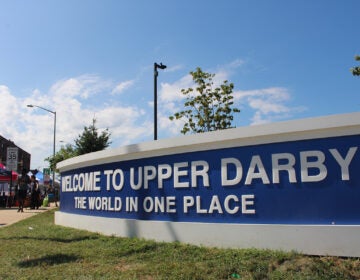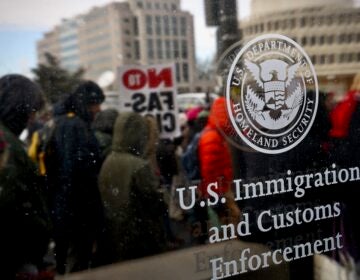Examining political strategy of ‘divide and conquer’ in Hazleton, Pa.
Professor and author Jamie Longazel joins NewsWorks Tonight host Dave Heller to discuss the legacy of the Illegal Immigration Relief Act on the community of Hazleton, Pa.
Listen 8:44
U.S. Rep. Lou Barletta, R-Pa., ushered a crackdown on undocumented immigrants. while he was mayor of Hazleton. (AP photo/Matt Slocum)
Jamie Longazel is a professor of law and society at John Jay College of Criminal Justice in New York City. He’s also the author of the book “Undocumented Fears: Immigration and the Politics of Divide and Conquer in Hazleton, Pennsylvania.”
Longazel joined NewsWorks Tonight host Dave Heller to discuss the legacy of the Illegal Immigration Relief Act on the community of Hazleton and how then-Mayor Lou Barletta ushered a crackdown on undocumented immigrants.
_
How attitudes in Hazleton have changed over the decade since the passage of the Illegal Immigration Relief Act, which was later found to be unconstitutional:
Well you know you can certainly see the the legacy of that ordinance. Hazleton was clearly in decline economically. It was seeing its manufacturing base leaving. It was beginning to rely on temporary lower wage employment, and the town was struggling economically. And people, I found, were sort of grasping for an explanation to figure out what was going on, and a big part of the implications of the ordinance was that it pointed its finger at the newcomers — at the Latino population — for all of Hazleton’s problems.
How then-Mayor Barletta galvanized the fears of those who feel that it wasn’t an economic exploitation but rather a racial one:
We saw this in the Donald Trump campaign, too. He was talking about bringing manufacturing back, I think these are politicians who are playing to economic fears that are real, but they’re getting interpreted through the lens of race. It’s not that big companies are coming in and not paying people enough, it’s not that manufacturing jobs are seeking more profits overseas, it’s about the “other,” it’s about “them” — this construct of the undocumented immigrant who’s hurting us, who’s hurting our local economy.
How the ordinance came about and how the “other” was described in the Illegal Immigrant Relief Act:
The [ordinance] came about after the murder of a white Hazleton resident allegedly committed by two undocumented Latino men. I say allegedly because these men were never actually convicted of this crime even though Congressman Barletta continues to bring it up over and over again. And all of a sudden, we have what in sociology we call a moral panic. People are concerned about this undocumented immigrant invasion, that they’re committing crime all over town when the reality is that, from 2000, about the point when the immigrant population began arriving in Hazleton, until 2006 when the IIRA was passed, undocumented immigrants in Hazleton counted for 0.25 percent of all arrestees. They were talking about undocumented folks being burdensome on the city, draining city resources — but there was no evidence to support any of that in the debates nor the subsequent trial over the IIRA, yet this explanation persists. You hear it in the way people talk about this problem. It’s that “they” are burdening our city, not the large meat-packing plant that’s getting away with a dozen years of tax breaks.
Changing perspectives in Hazleton from before the 2016 election to now:
I think that, during the 2016 election, Hazleton began to look a lot more like the Hazleton of 2006. The dust was settling a bit, but tensions crept back up. We’re seeing a lot of these markers … Confederate flags or these sorts of things that really speak to this enduring frustration. And so the tension is still there despite important progress that’s been made. But I think, most importantly, the economic circumstances really haven’t changed. It’s still an economy that’s characterized by these low-paying temporary jobs that has showed no signs of changing. Until that does, I don’t think we’re going to see anything really meaningfully different.
WHYY is your source for fact-based, in-depth journalism and information. As a nonprofit organization, we rely on financial support from readers like you. Please give today.





